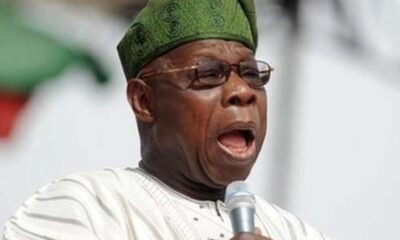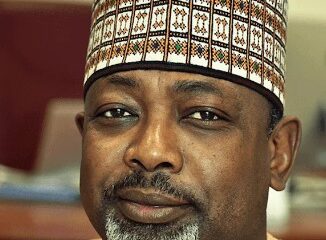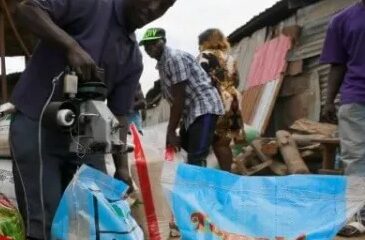NEWS
Danger Signer: Niger, Burkina Faso, And Mali Resign From The ECOWAS
Published
1 year agoon


The ECOWAS, which is currently led by Nigerian President Bola Ahmed Tinubu, has, according to Captain Ibrahim Traoré of Burkina Faso, Colonel Assimi Goita of Mali, and Brigadier Gen. Abdourahamane Tiani of Niger, “adopted an irrational and unacceptable posture by imposing illegal, illegitimate, inhumane and irresponsible sanctions in violation of its own texts.”

})(jQuery);
Colonel Amadou Abdramane, spokesman for the Niger junta, stated in the statement that the three states claim ECOWAS has strayed from “the ideals of its founding fathers and spirit of Pan-Africanism” and that the bloc has been taken over by foreign powers, betraying its founding principles, and has turned into a “threat to its member states and its populations whose happiness it is supposed to ensure.”

The military-led administrations of Burkina Faso, Mali, and Niger announced their decision to leave ECOWAS immediately in a unified statement that was made public on Sunday. The principal reasons for the bloc’s withdrawal, according to the leaders, were its defection from its original ideals and its inability to assist member nations in their battles against terrorism and instability. They said that ECOWAS had been taken over by foreign interests, had abandoned its initial goals, and was now posing a threat to the people and member states of the organization.
The situation is made more complicated by the creation of the Alliance of Sahel States and the alliance with foreign forces. In order to resolve the frustrations and concerns of all parties involved, diplomatic efforts must be intensified. The sub-Saharan area can only overcome these obstacles and clear the path for a peaceful and prosperous future by working together and becoming one.
The Response of ECOWAS and the Uncertain Future
In reaction to the announcement of withdrawal, ECOWAS said it had not received any official communication from the three nations of their intention to leave the bloc. The regional organization reaffirmed Burkina Faso, Mali, and Niger’s crucial roles in the community and underlined its commitment to a diplomatic resolution of the political deadlock.
But these three countries’ withdrawal begs important concerns about ECOWAS’s future. The bloc, which was founded in 1975 with the goal of fostering economic integration and collaboration among its members, has encountered many difficulties lately, such as an increase in political unrest and coups. Following their respective military takeovers, Burkina Faso, Mali, and Niger were suspended; additionally, the imposition of heavy sanctions, further strained the relationship between these countries and ECOWAS.
The role of external powers in the alliance of Sahel States
To address their security concerns and stop Islamist violence, Burkina Faso, Mali, and Niger established the “Alliance of Sahel States” in response to their common frustrations with ECOWAS. With the severing of military connections with France, their former colonial power, and their request for aid from Russia and Russian mercenaries, this alliance represents a dramatic change in their foreign policy.
There are worries that instability and bloodshed may spread throughout the Sahel region as a result of the region’s exit from ECOWAS and alignment with foreign powers. The French military’s departure from these nations, along with economic penalties, have produced an unstable atmosphere that may have an impact on the stability of nearby coastal nations like Ghana, Togo, Benin, and Ivory Coast.
The Humanitarian and Security Consequences
The Sahel region has been plagued by extremist attacks, with a sharp increase in violence and conflict-related fatalities in recent years. The withdrawal of Burkina Faso, Mali, and Niger from ECOWAS could further exacerbate these challenges, leaving the countries more vulnerable to terrorist groups and hindering regional efforts to combat insecurity.
It is also impossible to ignore the withdrawal’s economic effects. Being a member of ECOWAS has made it easier for people and products to travel freely around the region, which has aided in development and economic progress. The removal might cause trade disruptions, raise the cost of goods, and perhaps result in the reinstatement of travel visa requirements.
The Importance of Unity and Diplomatic Efforts
In order to address the concerns expressed by Burkina Faso, Mali, and Niger, high-level diplomacy and communication among regional and international actors is imperative given the gravity of the issue. The restoration of peace, stability, and unity within the sub-Saharan region requires a collective effort to find common ground and resolve the underlying issues.
Nigeria is an important regional power and ECOWAS member, and it plays a crucial role in mediating and assisting in the peaceful settlement. The administration of President Tinubu ought to utilize diplomatic tactics to avert additional exacerbation of economic and security turmoil within the sub-Saharan region.
A few influential Nigerians have expressed alarm, expressing worries about the potentially disastrous consequences of the three nations’ combined withdrawal from the ECOWAS.
On his former Twitter account, x, Femi Fani Kayode posted, saying, “Mali, Burkina Faso, and Mali’s withdrawal from ECOWAS is a sad and unfortunate development.” What’s much more concerning and seriously concerning for our security is that they have established a hostile confederation directly on our northern border. May God bring back the unity and brotherhood we once enjoyed in our sub-region and may He preserve the peace.”
You may like


Consult With Zimbabwe, Obasanjo Advises The Tinubu Government


Banking Is Involved In 70% of Financial Crimes In Nigeria


Gov Mutfwang: Buhari Sold Nigeria’s Future


Nigerian Government To Start Distributing Of Grains To All States


Trader Arrested For Repackaging Local Rice Into Foreign Rice Bags To Make Excess Profits


Abuja Ware House Destroyed, Food Items Taken Away By Hungry Nigerian






























